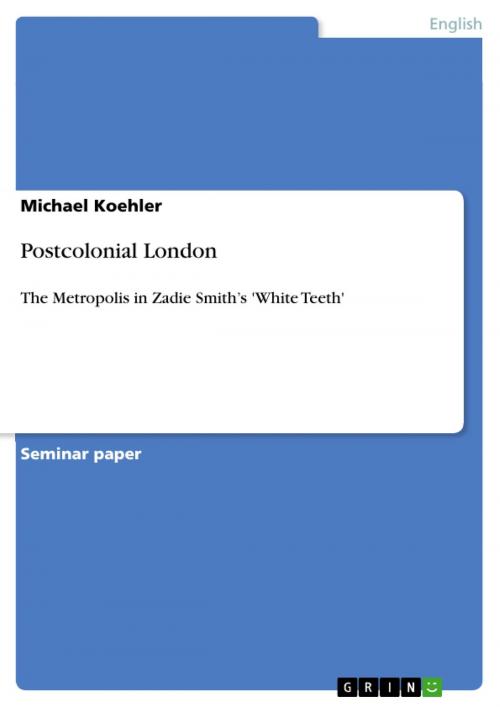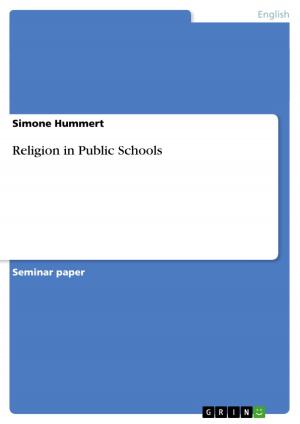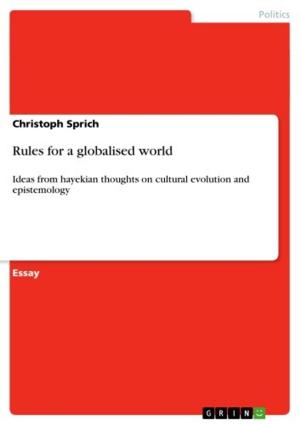Postcolonial London
The Metropolis in Zadie Smith's 'White Teeth'
Fiction & Literature, Literary Theory & Criticism, British| Author: | Michael Koehler | ISBN: | 9783640378418 |
| Publisher: | GRIN Publishing | Publication: | July 20, 2009 |
| Imprint: | GRIN Publishing | Language: | English |
| Author: | Michael Koehler |
| ISBN: | 9783640378418 |
| Publisher: | GRIN Publishing |
| Publication: | July 20, 2009 |
| Imprint: | GRIN Publishing |
| Language: | English |
Seminar paper from the year 2006 in the subject English Language and Literature Studies - Literature, grade: 1, University of Marburg (Institut für Anglistik und Amerikanistik), course: Postmodern and/or Postcolonial:Contemporary Writing from Britain and the Commonwealth, language: English, abstract: Zadie Smith's novel 'White Teeth' deals with families and generations from diverse ethnic backgrounds; and in the four main chapters Archie 1974, 1945, Samad 1984, 1857, Irie 1990, 1907, and Magid, Millat and Marcus 1992, 1999, she approaches them from several angles. As a result, there has been a discussion on who is to be treated as the central character in this novel. One possible answer to this is offered by Nina Shen Rastogi: The main character in White Teeth isn't a character in any traditional sense - it's the city of London itself. Smith's goal is less to paint a portrait of any particular character than it is to create a large-scale character sketch of a particular place and a particular time. White Teeth is about the foibles of a community of near-strangers and almost-friends as it collectively stumbles towards an uncertain future. The paper will investigate this approach by dealing with London as it is depicted in this postcolonial novel. After a working definition on the diversely discussed notion of postcolonialism (I.1), there will be a closer look on London, both as a physical location (I.2.a) and a literary region (I.2.b). The main issues will be the history of immigration, facts about multiculturalism today, and a brief look on how the colonial legacy has been depicted in postcolonial literature in London. A conclusion (I.3) will summarize the results and present some main questions for the analysis of White Teeth (II). Here, the paper will take a look on the role of the characters interacting with each other and on how they compromise between their cultural legacy and London's society (II.1). This will be the major part of the analysis. In two short chapters, this view will be extended by the use of location (II.2) and language (II.3). The conclusion finally tries to sum up the main aspects gathered in this line of argument.
Seminar paper from the year 2006 in the subject English Language and Literature Studies - Literature, grade: 1, University of Marburg (Institut für Anglistik und Amerikanistik), course: Postmodern and/or Postcolonial:Contemporary Writing from Britain and the Commonwealth, language: English, abstract: Zadie Smith's novel 'White Teeth' deals with families and generations from diverse ethnic backgrounds; and in the four main chapters Archie 1974, 1945, Samad 1984, 1857, Irie 1990, 1907, and Magid, Millat and Marcus 1992, 1999, she approaches them from several angles. As a result, there has been a discussion on who is to be treated as the central character in this novel. One possible answer to this is offered by Nina Shen Rastogi: The main character in White Teeth isn't a character in any traditional sense - it's the city of London itself. Smith's goal is less to paint a portrait of any particular character than it is to create a large-scale character sketch of a particular place and a particular time. White Teeth is about the foibles of a community of near-strangers and almost-friends as it collectively stumbles towards an uncertain future. The paper will investigate this approach by dealing with London as it is depicted in this postcolonial novel. After a working definition on the diversely discussed notion of postcolonialism (I.1), there will be a closer look on London, both as a physical location (I.2.a) and a literary region (I.2.b). The main issues will be the history of immigration, facts about multiculturalism today, and a brief look on how the colonial legacy has been depicted in postcolonial literature in London. A conclusion (I.3) will summarize the results and present some main questions for the analysis of White Teeth (II). Here, the paper will take a look on the role of the characters interacting with each other and on how they compromise between their cultural legacy and London's society (II.1). This will be the major part of the analysis. In two short chapters, this view will be extended by the use of location (II.2) and language (II.3). The conclusion finally tries to sum up the main aspects gathered in this line of argument.















